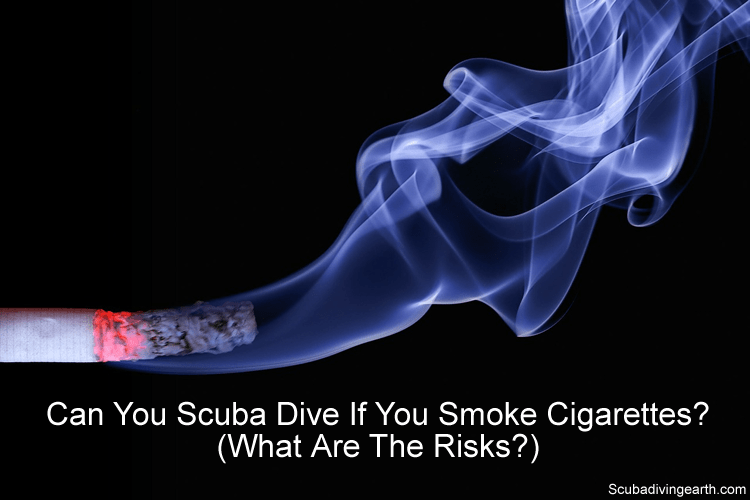
Scuba diving and smoking shouldn’t go together but if you are a smoker, what are the associated risks if you do scuba dive?
I would put smoking into the category of what you shouldn’t do before or after scuba diving? If you want to scuba dive and if you are a smoker it’s important to know there are added risks if you fail to quit smoking first. But can you scuba dive if you smoke cigarettes?
The effects if you smoke cigarettes and scuba dive include:
- Reduced ability for efficient lung gas exchange.
- Increased levels of carbon monoxide in your blood reducing its effectiveness to carry oxygen to your body’s tissues.
- An increased risk of decompression illness and more severe symptoms.
- An increased risk of heart attack or stroke relating to the effects of nicotine.
- A greater risk for pulmonary barotrauma and gas embolism.
The best way to do more diving is to book yourself on a scuba diving liveaboard. You can check the latest and best deals on liveaboards using the following window:
Cigarette smoke and nicotine is damaging to your body. It’s likely to affect your ability to adjust to a pressurised environment. If you choose to mix scuba diving and smoking, then you ought to be aware of the added risks of being a ‘scuba diver that smokes‘.
If you’re finding it hard to quit smoking, keep the faith, as the good news is that most of the adverse effects associated with smoking are reversible once you quit. There’s a solution for this later in this article.
Adverse effects from smoking cigarettes and scuba diving
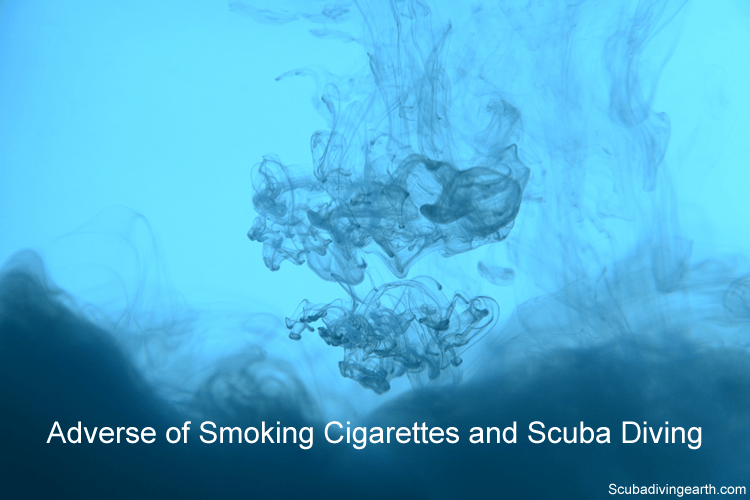
There are a number of adverse affects that cigarettes have while scuba diving.
Whilst for most it’s understood that smoking is bad for your health generally. Not everyone is aware of the added risks associated with smoking and scuba diving combined.
In The Framingham Study, which was carried out over over 34 years with 5,209 individuals, there were some significant findings. These include the following quotes:
After 34 years of follow-up, it was observed that cigarette smoking was the prime determinant of chronic cough, and reduced both forced vital capacity and the 1-second forced expiratory volume.
The US National Library of Medicine National Institutes of Health
US National Library of Medicine National Institutes of Health
A significant relationship was observed between cigarette smoking and the incidence of cancer of the lung, stroke and transient ischemic attacks, intermittent claudication, and total cardiovascular disease, and most especially the average annual death rate.
In addition to the above study DAN physician Jim Caruso MD has written a paper about scuba diving and smoking “Caution First: Why Cigarette Smoking and Diving Don’t Mix“.

In this smoking paper Caruso discusses the following points in relation to smoking and scuba diving:
- Carbon monoxide (CO) and its affect on the reduced ability of red blood cells to carry oxygen.
- Lung irritation and the increased risk for pulmonary barotrauma and gas embolism.
- Emphysema and the reduced ability of the lung’s alveoli to exchange gas which also carries an increased risk for pulmonary barotrauma and gas embolism.
- Nicotine and the risk this has on the a scuba diving suffering from a sudden heart attack or stroke.
A follow up paper reported by DAN is by Dr. David Buch: Smoking and Diving : Do the Two Make A Risk Factor For Decompression Illness?”
Dr Buch considers the following:
- Does smoking increase the risk of Decompression Illness (DCI)?
- A smoking dive study from data collected by Divers Alert Network.
- The increased risk for heavy smokers and how they are twice as likely to have more severe symptoms of DCI.
From the above quotes and looking at smoking and scuba diving specifically, I’d say the following should be noted.

The affects on scuba diving of carbon monoxide from smoking cigarettes
Cigarette smoke contains many toxins. One such toxin is carbon monoxide (CO), which is the result of an incomplete combustion of organic substances. Carbon monoxide attaches to your red blood cells and reduces it’s ability to carry oxygen to the body’s tissues.
Diving involves the effective gas exchange of oxygen (O) and carbon dioxide (CO2). But carbon monoxide interferes with this gas exchange where heavy and frequent smokers have 5-times the levels of carbon monoxide in their blood compared to non-smokers.
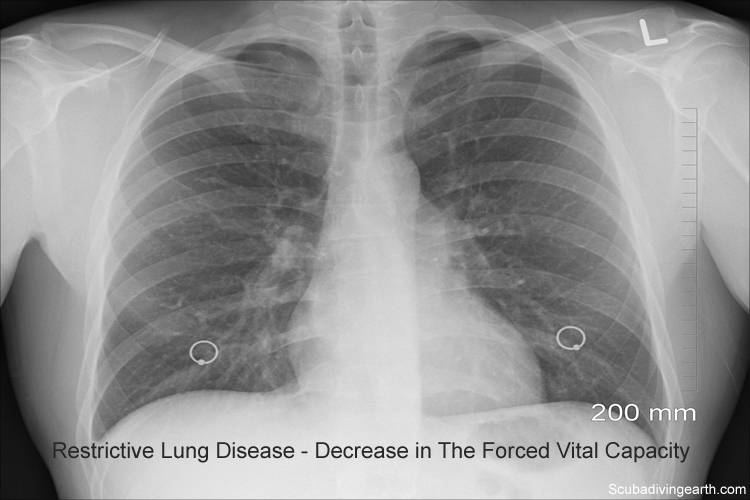
Scuba diving and smoking cigarettes – Restrictive lung disease and decrease in the forced vital capacity
A decrease in the forced vital capacity (or restrictive lung disease) restricts lung expansion and a decreases lung volume. This also results in an increased work of breathing and an inadequate ventilation and/or oxygenation.
To enjoy any sport it’s recommended to be fit and healthy. The same applies for scuba diving. Probably one of the most important factors for scuba diving is the ability to breathe. And the ability to be able to breathe well.
Scuba diving involves breathing air in an alien environment using an aqualung
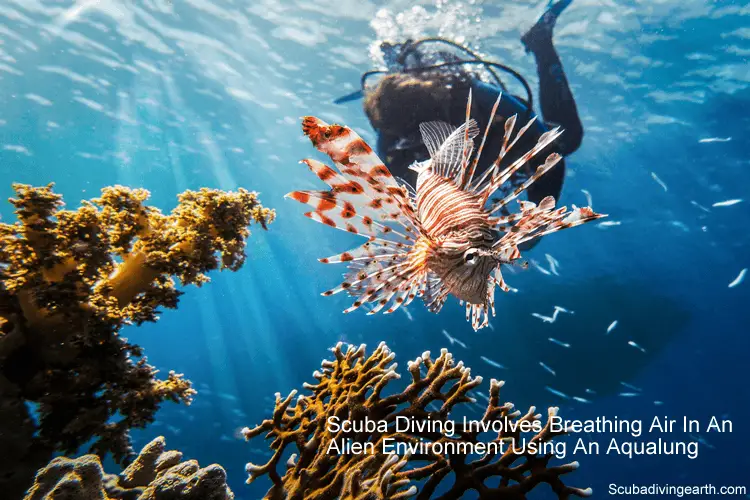
Bearing in mind you’re breathing in an alien environment. Which means you’re only able to breathe with the benefit of an aqualung. That means you don’t have the luxury of an unlimited air supply when your underwater, as you do on land.
Each scuba dive is restricted by the amount of air you can physically carry. But also by how long you can make this limited air supply last.
There’s another limitation. This further limitation relates to depth and decompression. (See below for the added risk of decompression sickness for scuba divers that smoke).
But ignoring the added decompression sickness risk factor for a moment, I know when I dive, I want to get the most out of every last drop of air in my dive tank.
I want each dive to last for as long as possible.
I’m 25% larger than the average scuba diver. This is because I’m 6’6″ tall (around 2 metres). That means I have to work extra hard than the average scuba diver to conserve my air.
If you smoke and scuba dive, but you also have restrictive lung disease, this will impact on your air consumption.
That will mean your air will not last as long as most. This will decrease your dive times and limit your enjoyment. Aside from the other associated health risks if you dive with this disease.
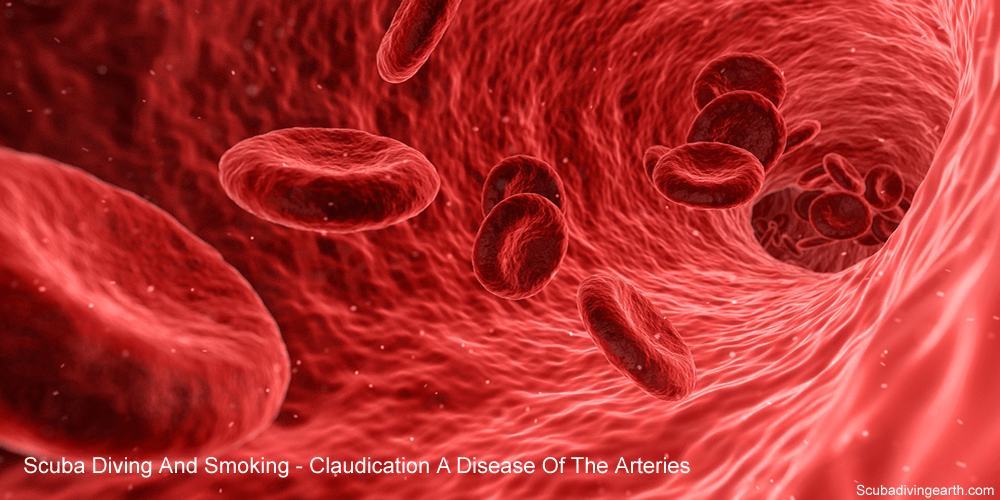
Scuba diving and smoking cigarettes – Claudication a disease of the arteries brought on by nicotine from smoking cigarettes
Claudication is a common condition in which pain occurs in the legs with exercise. The pain is the result of a reduction in the blood flow to the muscles of the legs.
The cause of claudication is from the hardening of the arteries. This is called atherosclerosis, which not only affects the leg arteries, but also those close to your heart too. Nicotine is one of the causes of atherosclerosis in smokers.
Risk of heart attacks and strokes when diving
This can lead to heart attacks and strokes. Neither of which is something you want to experience at all, let alone at 30 metres (100 feet) underwater when you’re scuba diving.
Claudication can, therefore, be a warning of more serious disease. If you smoke, it is vital that you stop smoking completely.
NHS Cambridge University Hospitals
The implication of claudication and atherosclerosis is your body is less efficient at transporting blood around your body.
“Nicotine temporarily causes blood vessels to constrict, elevates blood
Dr. Jim Caruso – Why smoking and diving don’t mix DAN
pressure, and with chronic use contributes to the development of
atherosclerosis. A disease such as atherosclerosis can eventually lead to
problems in getting the necessary amount of blood, and therefore oxygen, to the tissues.”
One of the main functions of your blood is to transfer oxygen from your lungs to the rest of your body. This is part of life and how we function as human beings.
Claudication and atherosclerosis will reduce your ability to transfer oxygen to your muscles and tissues. That means your body’s ability to oxygenate itself is less than efficient.
This in turn means you’ll breath more air than a non-smoker would, in order for your body to get the oxygen it needs to survive. The more air you breath will thereby reduce your dive times and therefore your scuba diving enjoyment.
However, a more serious problem associated with claudication and the associated implications of this disease is thought to impact on your ability to decompress properly on your ascent (see below).
A combination of claudication and restrictive lung disease contributes to getting out of breath more easily
There are times when scuba divers need to exert themselves. This could be swimming to the shot line from the dive boat or back to the shot line at the end of a dive.
If you’re unfit, you will get out of breath more quickly. But if you are suffering from the negative effects from long-term smoking, you may find you get out of breath in these situations even more easily.
‘Controlled breathing,’ even when the conditions are adverse, is key to a safe and enjoyable dive.
An example of an adverse condition on a scuba dive may be a drift or an underwater current. It’s amazing how even with a very small current, this can be extremely difficult to swim against. This has happened to me on a few occasions, where the current is pushing us in the wrong direction.
If you find yourself swimming against a current in order to get back to the shot line against a current and you’re suffering from an unhealthy state Brough on by smoking cigarettes, you may struggle. You will end up gulping your air and you may end up in difficulty.
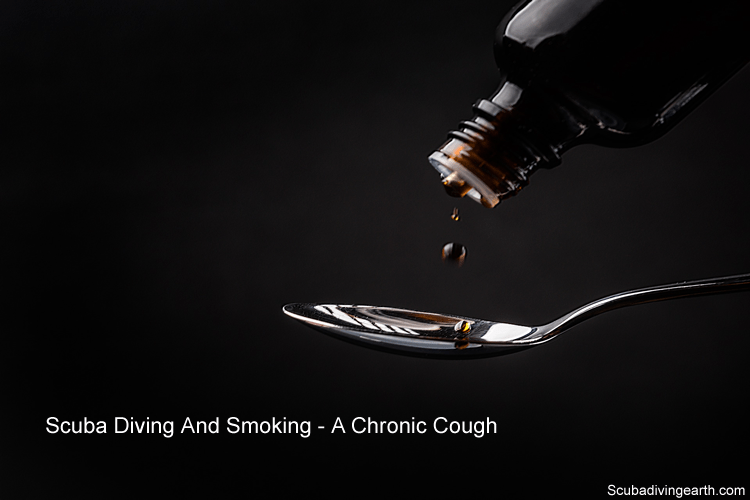
Scuba diving and smoking cigarettes – A Chronic cough and lung irritation
We all know the sound of the smoker’s cough. The distinct sound of rattling mucous in the lungs, which sometimes doesn’t dislodge too easily. This can lead to a prolonged coughing fit.
Having one of these coughing fits on land is bad enough, but underwater this wouldn’t be too pleasant. It’s possible to cough with a scuba mouthpiece in your mouth, as I’ve done this myself. However, it’s not very pleasant and of course it uses up more of that precious air supply.
But it’s what’s behind the smoker’s cough that scuba divers should be worried about. The smoker’s cough is a sign of an irritation of the airways which may predisposes divers that smoke to episodes of acute bronchospasm. A bronchospasm will have an increased risk for pulmonary barotrauma and gas embolism.
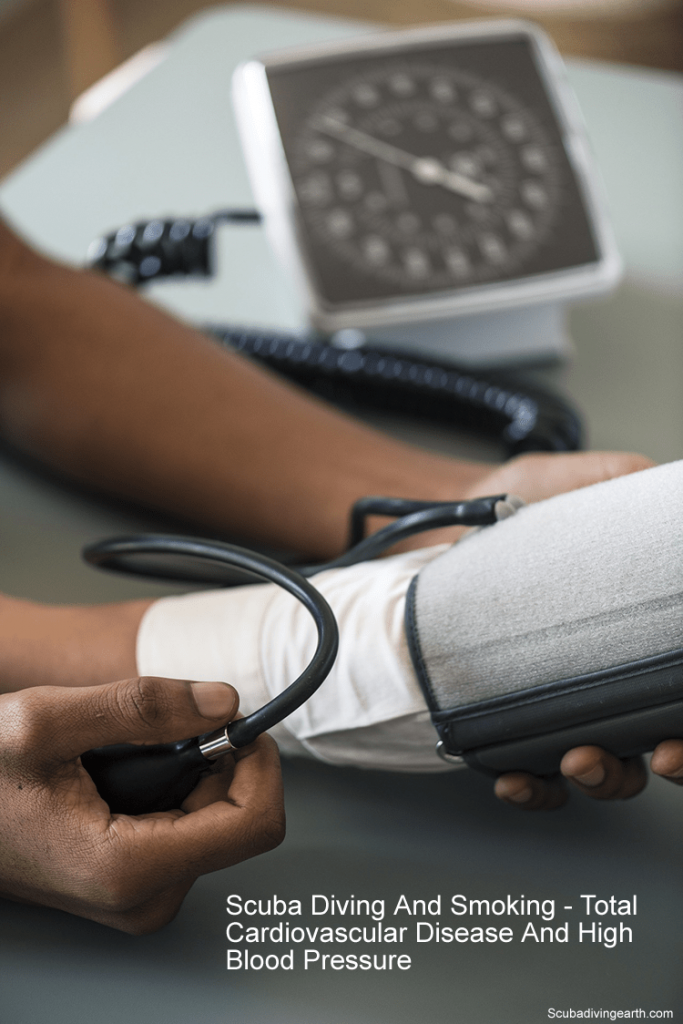
Scuba diving and smoking cigarettes – Total cardiovascular disease and high blood pressure
One of the main risk factors of cardiovascular disease (CVD) is high blood pressure, as listed by the NHS UK. One of the causes of high blood pressure, as listed by the UK’s NHS is smoking.
Reading this article on ‘Can I dive with high blood pressure‘, it’s clear to me that high blood pressure is a risk to scuba divers. A quote from this page reads:
There is an increased risk of a condition called immersion pulmonary oedema in those with high blood pressure. This is caused by an alteration of the fluid loads on the heart from the combination of submersion in water and high blood pressure. It is a rare condition and is difficult to predict and results in fluid build up on the lungs and difficulty breathing. It usually has to be treated in hospital as an emergency and can mean you have to abort a dive suddenly which increases your risk of DCI.
DDRC Healthcare
Picking up on the term ‘Immersion Pulmonary Oedema, I thought I’d look this up too. Please take a read of this interesting article on the Divers Alert Network (DAN).
A quote from this article reads:
Immersion pulmonary edema (IPE) is a form of pulmonary edema — an accumulation of fluid in the tissues of the lungs — that specifically affects divers and swimmers. Immersion at depth is a key factor in the development of IPE.
Divers Alert Network
Reading this article, it goes on to say ‘Once pulmonary edema occurs, hypoxia (lack of an adequate supply of oxygen) leads to constriction of the pulmonary vasculature, which worsens the cascade of ill effects.’ But in addition to this, ‘The situation can be further aggravated by the accompanying dyspnea, which, when experienced underwater, can induce panic and uncontrolled ascent to the surface — leading to overinflation of the lungs and even near-drowning.’
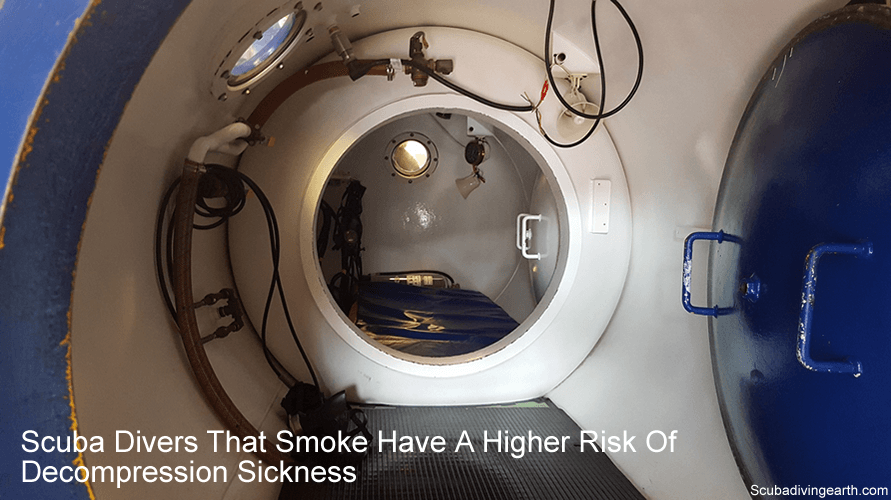
Scuba divers that smoke cigarettes have a higher risk of decompression sickness
In an article on decompression sickness risk factors, one of the factors listed is smoking. In the factors that BSAC list, smoking is in their safe diving guide, alongside fitness, age, alcohol and obesity
BSAC consider that all these factors should be taken into account by diving conservatively and not pushing the limits of your chosen decompression computer or table.
It makes sense after reading the quotes taken from The Framingham Study that this would be the case.
What causes decompression sickness?
Decompression sickness is caused when nitrogen bubbles form if a scuba diver ascends too quickly known as a fast ascent. It can also happen to scuba divers who fail to carry out required decompression stops.
But decompression of your body, which happens on every scuba dive as you ascend, relies on effective bodily functioning.
As you dive deeper, the water pressure increases. As a result of this increased pressure, nitrogen builds-up in your blood and in your tissues. If you are young, fit and healthy, then the reverse of this process (i.e. decompression) happens well.
However, as you age and if you’re not very fit, this process will be slower than someone younger and fitter. But if you add into this mix that you’re a smoker, you’ve just added another level of inefficiency to your decompression process.
If you continue to smoke when you scuba dive, at best you need to be more conservative with your approach to your decompression, your ascent rates and your bottom times for your dives. As recommended by The British Subaqua Club.
But at worst, and over a prolonged period of smoking, the long term effects of smoking and the damage it will do to your body, you have a higher than average risk of suffering from decompression sickness.
In the article by Dr David Buch he discusses the study of 4,000 scuba divers from data collected by Divers Alert Network (DAN), as referred to above. The conclusions drawn suggest that smoking cigarettes may cause divers with DCI to manifest more severe symptoms than non-smokers. The study found that 15-pack year smokers who dived were at greater risk, who are smokers that have smoked a packet of cigarette per day for 15 years.
Remember that at best decompression sickness can cause a minor skin bend or rash, plus pain, but at worst it can result in death.

Transient ischemic attacks is a risk if you scuba dive and you smoke cigarettes
A transient ischemic attack is a brief episode of neurological dysfunction caused by loss of blood flow in the brain, spinal cord or retina. A transient ischemic (TIA) attack is similar to a stroke, except that it does not cause tissue death like a stroke does.
Symptoms include weakness or numbness on one side of the body, which is generally on the opposite side of the body from the affected hemisphere of the brain.
A TIA may cause sudden dimming or loss of vision, difficulty speaking or understanding language.
A TIA is not something that sounds nice to happen at the best of times. But I would suspect this is not something you’d want to happen whilst you’re scuba diving.
Although there is a lack of robust studies demonstrating the efficacy of lifestyle changes in preventing TIA, many medical professionals recommend them and these include: Avoiding smoking.
Wikipedia
There’s a greater risk of panic attacks and nitrogen narcosis scuba diving if you smoke cigarettes
It has been well documented that smoking cigarettes can affect the onset of panic attacks and panic disorder.
Although I don’t smoke myself, I have experienced a panic attack underwater. Let me tell you it’s not nice! It has the potential for creating an extremely dangerous situation. Not only for you as a smoker, but also for your dive buddy too.
In my case the panic attack was brought on by nitrogen narcosis. Nitrogen narcosis, or the ‘narks,’ can be brought-on at depths in excess of 30+ metres (100+ feet). In my case I was diving at around 47 metres down (154 feet underwater).
If you combine scuba diving and smoking you may be asking for trouble. That’s even at depths shallower than 30 metres (100 feet). Which is without taking into account the possible additional risk of deeper dives to 30+ metres and the possible onset of nitrogen narcosis too.
This may be seen as an exaggeration, but reading an article on the Webmd.com, the opening paragraph is very interesting in this context:
If you think smoking calms you down, think again. A study of thousands of smokers shows that they are three times more likely than nonsmokers to have panic attacks and panic disorder.
Webmd.com – Panic Attacks More Common in Smokers
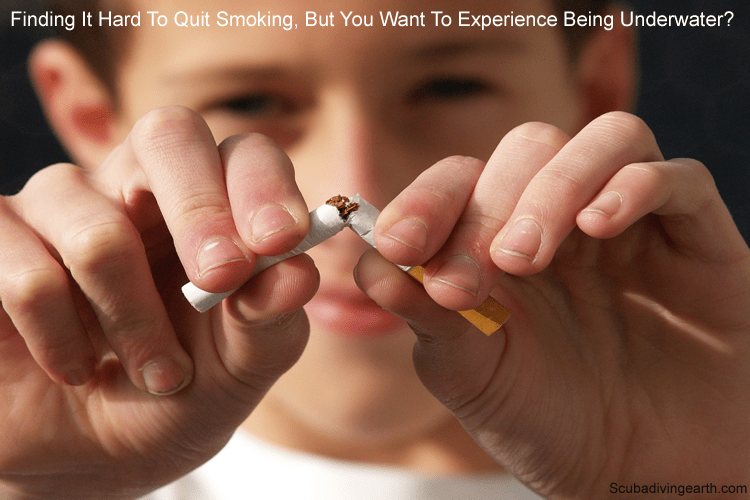
Are you finding it hard to quit smoking cigarettes as a scuba diver?
If you are finding it hard to quit smoking as a scuba diver. Or if you’re a smoker and you have the urge to experience being underwater and get certified as a scuba diver, then here’s a great way to solve this problem and quit smoking for good.
Also, if you’re thinking about curbing your habit instead (which is still smoking), or if you’re thinking about vaping and scuba diving instead, why not try this quick and easy ‘Quit Smoking Magic.’
Quit Smoking Magic – Discover How to Quit Smoking in as Little as 7 Days, Even if You’ve been a Chain Smoker for the Past 20 Years – with No Relapses, No extra MONEY Needed, and a 98% Success Rate, Guaranteed.
98% Success Rate Program For Smoking Cessation
If you are asking the question ‘should I give up smoking for diving?’ I’ve added an inspirational story below to help you.
But if you don’t think you can give up smoking for scuba diving, then consider giving up scuba diving for smoking for your own personal safety and for those around you.
I hope you choose the forma, as scuba diving is a wonderful sport. Anyway, here’s that inspirational story…
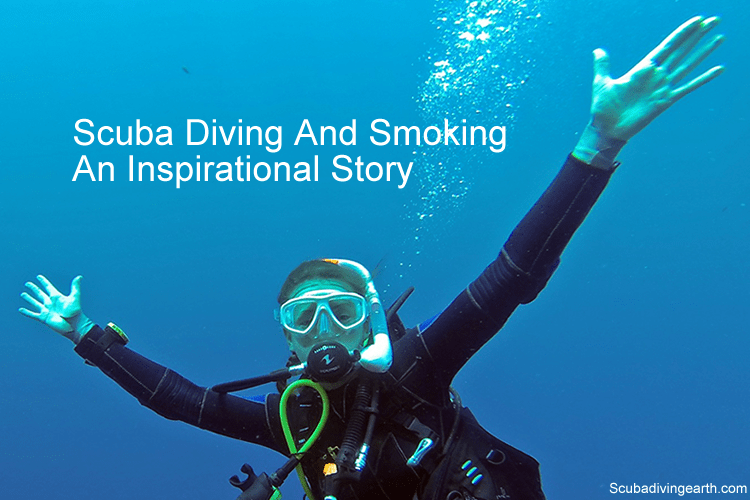
Can you scuba dive if you smoke cigarettes – an inspirational story
Whilst writing this article on scuba diving and smoking, I came across a few articles. But I also came across a comment on the scuba board community forum, which I’d also like to share some quotes from Melissa’s story here:
My husband and I made a deal to stop smoking together. He did I didn’t. I admired his will and strength to quit a habit that he has since he was 18, he is 31 now. Obviously inspired and determined to do myself a favor I decided to stop smoking. I went cold turkey, no gums no patches, no miracle helper. I haven’t smoked for 3 months now. Naturally I feel happier, healthier and smell way better. No more masking that cigarette smell by putting more perfume or cologne.
…the most incredible thing dawned to me, quitting smoking made me a much better diver, my air consumption improved significantly!!! 50 minutes dive time, 25 meters max depth, surfaced with still almost half tank of air remaining!! I can’t be happier; All 3 dives I did that day showed impressive amounts of air left, in my standards that is.
MORE AIR = MORE TIME UNDERWATER!!!!!
Mellisa on Scuba Board
What a great story to share. From the horse’s mouth.
‘Should I give up smoking cigarettes for diving‘ is the question
If you are still asking the question ‘should i give up smoking for diving,’ perhaps the comment below may help.
This comment I found on Reddit, and I apologise for the language if this offends you. It’s very blunt and to the point:
A lot of people have already mentioned the health effects.I’m sure it’s nothing you haven’t heard before so as someone who used to smoke quite a lot I will tell you this;
Your air consumption will be shit. Your dives will be short. You’ll piss off everyone you’re diving with that you ran out of air.
Tomythy on Reddit on ‘Cigarettes effect on diving
So if this article and the above story has inspired or motivated you to consider quitting smoking yourself. Or if Tomythy’s comment about air consumption works for you, but you’re still struggling going cold turkey on cigarettes, please feel free to try this quick and easy ‘Quit Smoking Magic.’
Quit Smoking Magic – Discover How to Quit Smoking in as Little as 7 Days, Even if You’ve been a Chain Smoker for the Past 20 Years – with No Relapses, No extra MONEY Needed, and a 98% Success Rate, Guaranteed.
98% Success Rate Program For Smoking Cessation

Seek medical advice before you scuba dive if you smoke cigarettes
All scuba divers must certify themselves physically fit to scuba dive. Before you scuba dive with any dive organisation, you first need to complete a health-check questionnaire.
This health check questionnaire is primarily to make sure you don’t scuba dive if you’re unfit to do so. But it also covers the scuba diving organisation, should the worst happen.
However, if you are concerned about any of the above diseases. Or if you are worried about what I’ve described and that it may apply to you, then please seek medical advice from a medical professional before you scuba dive.
The preference would be for you to speak with a medical doctor that has specialist scuba diving knowledge.
It’s better to be safe than sorry and you should be a responsible dive buddy. If something goes wrong for you, it also goes wrong for your buddy too.
More Reading: What should you not do after scuba diving (11 must NOT do’s after diving)
I hope you enjoyed this article about can you scuba dive if you smoke cigarettes
I’d love to hear from you. I’m hoping this article didn’t come across as a lecture or a rant. I want it to be informative and interesting. Please comment if it does come across that way. I’ve learned loads myself in the process of researching this article. The idea came about after I wrote about decompression sickness risk factors, one of which relates to smoking.
Tell us about your adventures of diving and snorkeling, in the comments below. I’d be particularly interest to hear about your stories about scuba diving and smoking, you quitting smoking or whatever else. Please also share your photos. Either from your underwater cameras or videos from your waterproof Gopro’s!
If this article hasn’t answered all of your questions. If you have more questions either about snorkeling or types of scuba diving (or specifically about can you scuba dive if you smoke cigarettes), please comment below with your questions.
There will also be many more articles about scuba diving (and snorkeling) for you to read and learn about these fabulous sports.
Have fun and be safe!




